Downloads & Publications
Learning
from practice
By documenting its projects, the Finck Foundation aims to share the knowledge gained during research, development and implementation with as many interested parties as possible.
A selection of completed projects, as well as bachelor and master theses can be found below.
Annual Reports
Finck Foundation
Annual Report
2024

In the new annual report of the Finck Foundation, we look back on the year 2024 – and at the same time look ahead: to the future of regenerative agriculture and forestry.
Finck Foundation
Annual Report
2023

The 2023 annual report of the Finck Foundation presents collected figures, facts, and insights from the time since the foundation was established.
Publications
Pioneering study on complex agroforestry systems in the temperate zone

Published in the scientific journal nature – scientific reports.
Trees shape the soil microbiome of an agrosilvopastoral and syntropic temperate agroforestry system.
JKI – Julius Kühn-Institut: Dr. Anna Vaupel, Nadine Herwig, Dr. Lukas Beule, Finck Stiftung: Max Küsters, Julia Toups, Benedikt Bösel, Januar 2025
Nesting aids

Information on the construction and installation of various nesting aids.
Max Hanschmann, Finck Foundation gGmbH,
2023
Biotope networking

Measures to Promote Biodiversity.
Inga Marieke Engelhardt, M.Sc. Biosphere Reserves Management at the University for Sustainable Development Eberswalde (HNEE),
January 2023
Agroforestry new plantation

Initial establishment of an agroforestry system with animal integration.
Max Küsters, Finck Foundation gGmbH, August 2022
Research work on our projects
Dynamic capabilities in regenerative agriculture

The Case of Dynamic Capabilities for Innovative Ecosystems in
Regenerative Agriculture.
M. A. Louisa Therese Sprenker, Alanus University of Arts and Social Sciences, Mai 2025
Site-specific knowledge: Water cycles

Long-term drought effects on landscape water storage and resilience under contrasting landuses.
Shuxin Luo, Doerthe Tetzlaff, Aaron Smith, Chris Soulsby, Journal of Hydrology, Mai 2025
Agroforestry establishment

Ecological and economic investigation of the establishment success of a diverse agroforestry
system.
B. Sc. Sina Manuela Weisbrodt, Hochschule Rhein-Waal, Dezember 2024
Climate-resilient forest transformation

Comparison of bud sizes of four tree species introduced on various forest transformation sites in pure pine stands in Brandenburg.
M.Sc. Ann-Catrin Sachs, Technical University of Munich, School of Life Sciences, September 2024
Ecosystem Services

Valuing Ecosystem Services in Regenerative Agriculture – Stakeholder Cooperation to Bridge the Financing Gap.
Bachelor Thesis 2024, Hannah Schmid, Zeppelin University: Department Corporate Management & Economics
Benefits and obstacles of regenerative agriculture

CO₂ emissions from a re-wetted small water body in an agricultural landscape.
Heinz M., Lorenz S., Meinikmann K.; Julius Kühn Institute, Institute for Ecological Chemistry, Plant Analysis and Stored Product Protection, 2024
Climate-resilient water distribution

Assessing impacts of alternative land use strategies on water
partitioning, storage and ages in drought-sensitive lowland
catchments using tracer-aided ecohydrological modelling.
Shuxin Luo, Doerthe Tetzlaff, Aaron Smith, Chris Soulsby; Hydrological Processes, December 2023
Climate-resilient forest transformation

Comparison of different forest transition concepts in a Brandenburg pine forest – Preparational study.
M.Sc. Reinhard Kückes, Hochschule für nachhaltige Entwicklung Eberswalde; Warsaw University of Life Sciences (WULS), April 2023
Benefits and obstacles of regenerative agriculture
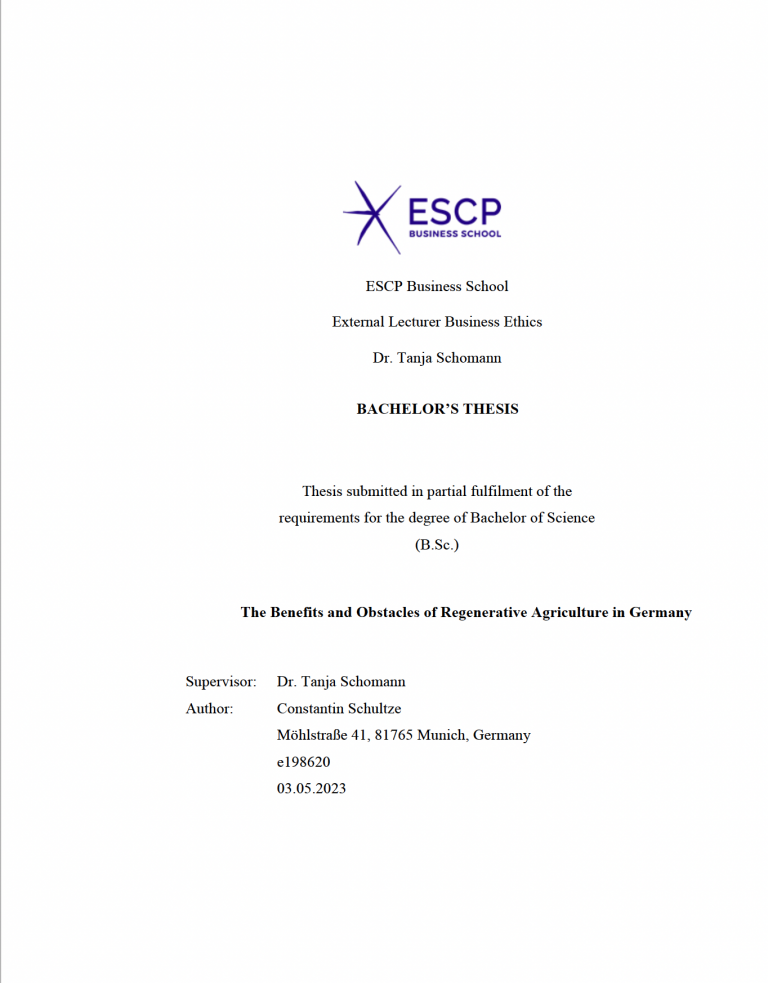
The Benefits and Obstacles of Regenerative Agriculture in Germany.
B. Sc. Constantin Schultze, ESCP Business School, May 2023
Case study agroforestry and ecosystem revitalisation
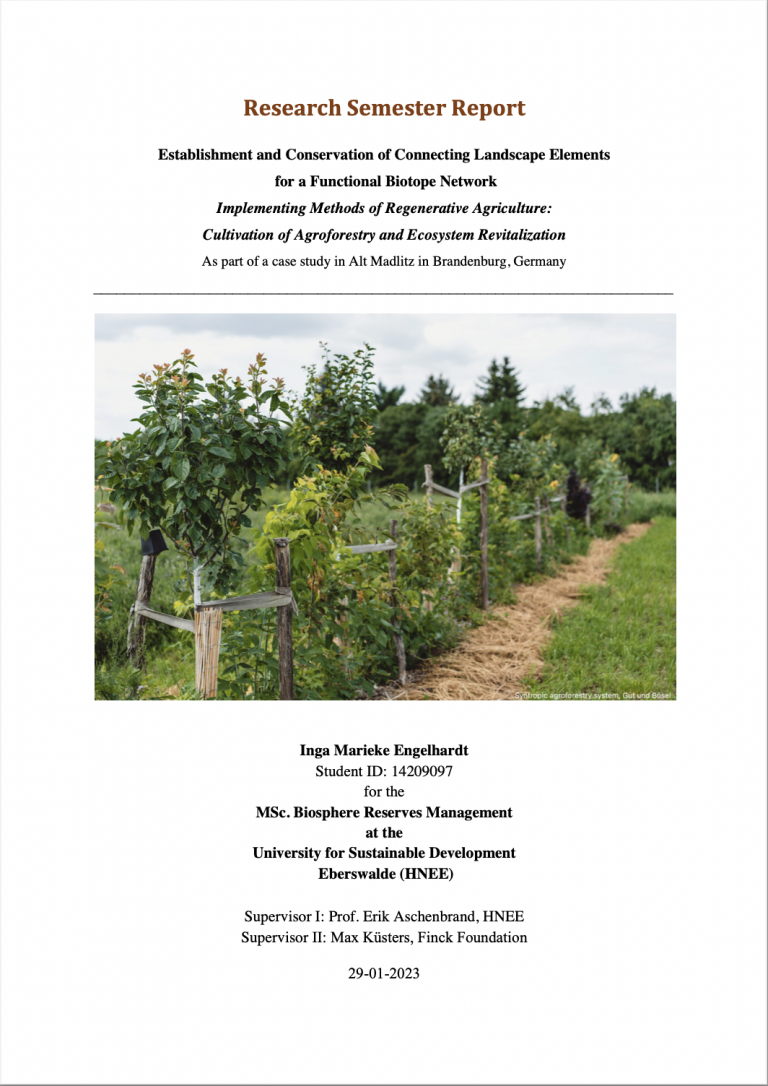
Establishment and Conservation of Connecting Landscape Elements
for a Functional Biotope Network.
Implementing Methods of Regenerative Agriculture.
M. Sc. Inga Marieke Engelhardt, University of Applied Sciences for Sustainable Development Eberswalde, January 2023
Value creation through agroforestry

Pathways to value creation with modern agroforestry systems. A qualitative analysis of commercial practices in Germany.
M. Sc. Zoé Jana Schierholz, University of Applied Sciences for Sustainable Development Eberswalde, December 2022
Carbon storage in
agroforestry systems
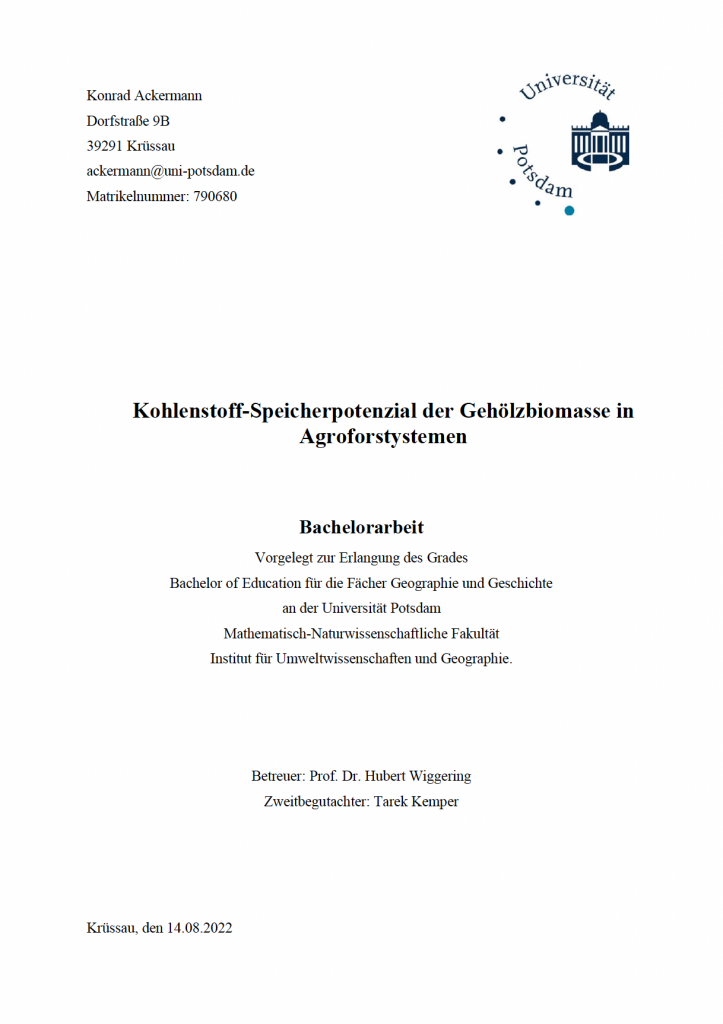
Carbon storage potential of woody biomass in agroforestry systems.
B. Ed. Konrad Ackermann, University of Potsdam, Faculty of Mathematics and Natural Sciences, Institute of Environmental Sciences and Geography, August 2022.
Mobile stall management
in agroforestry systems
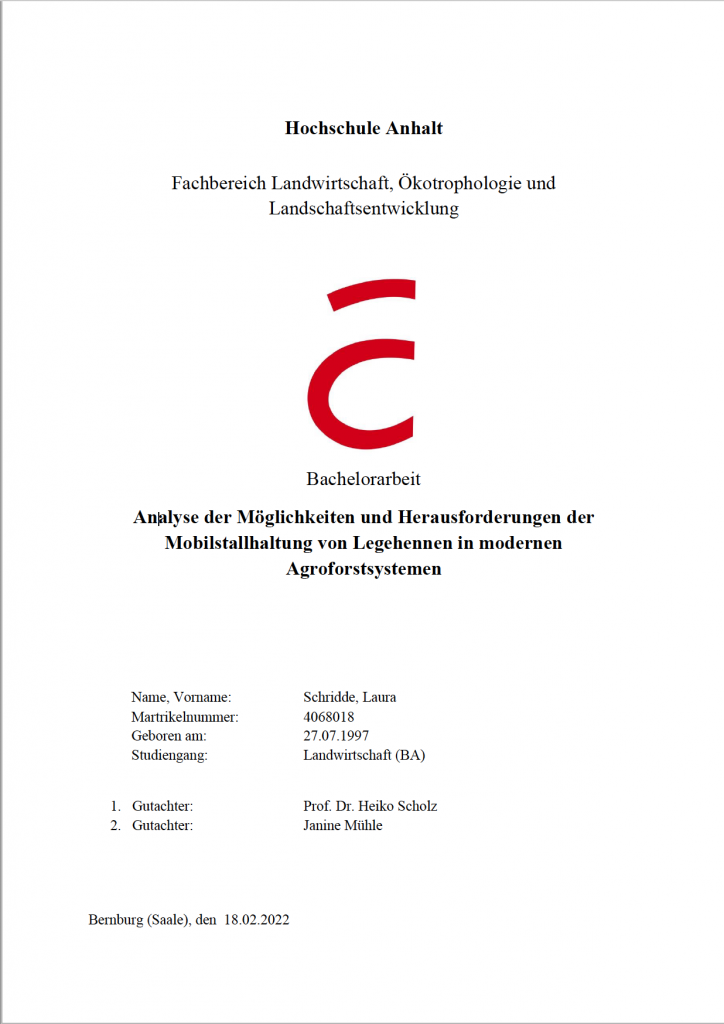
Analysis of the possibilities and challenges of mobile housing of laying hens in modern agroforestry systems.
BA Laura Schridde, Anhalt University of Applied Sciences, February 2022
Agroforestry as adaptation strategy to climate change
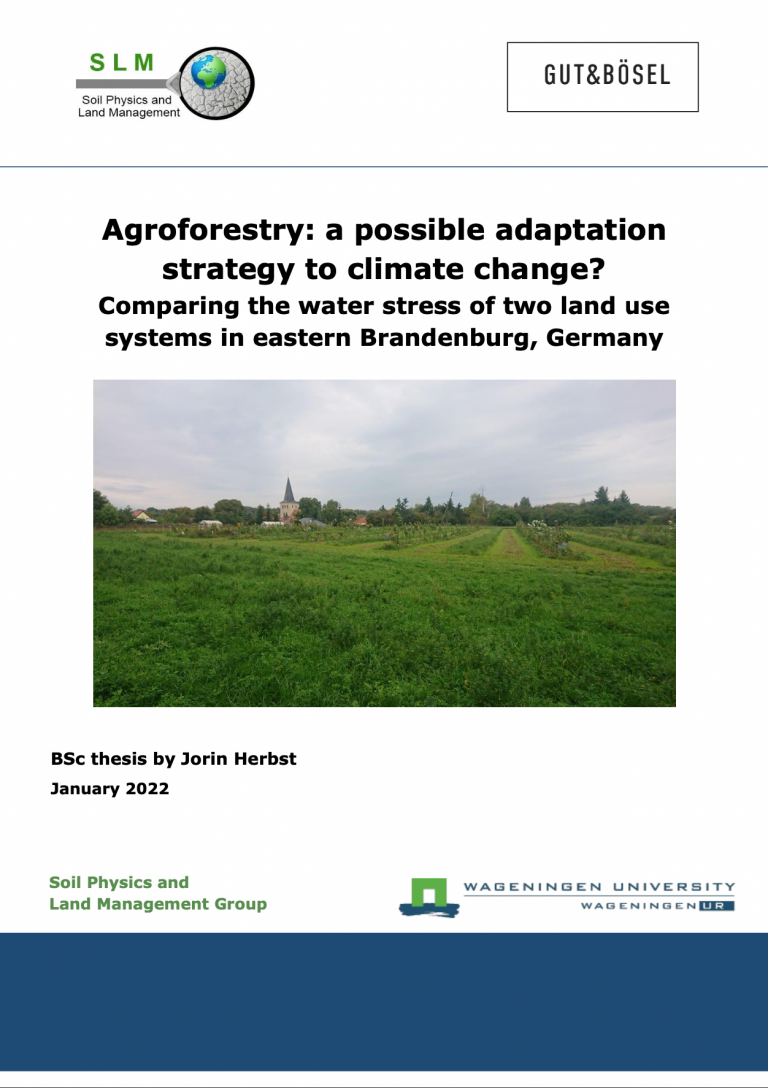
Agroforestry: a possible adaptation strategy to climate change? Comparing the water stress of two land use systems in eastern Brandenburg, Germany.
B. Sc. Jorin Herbst, Wageningen University, January 2022
Agroforestry systems
in Germany
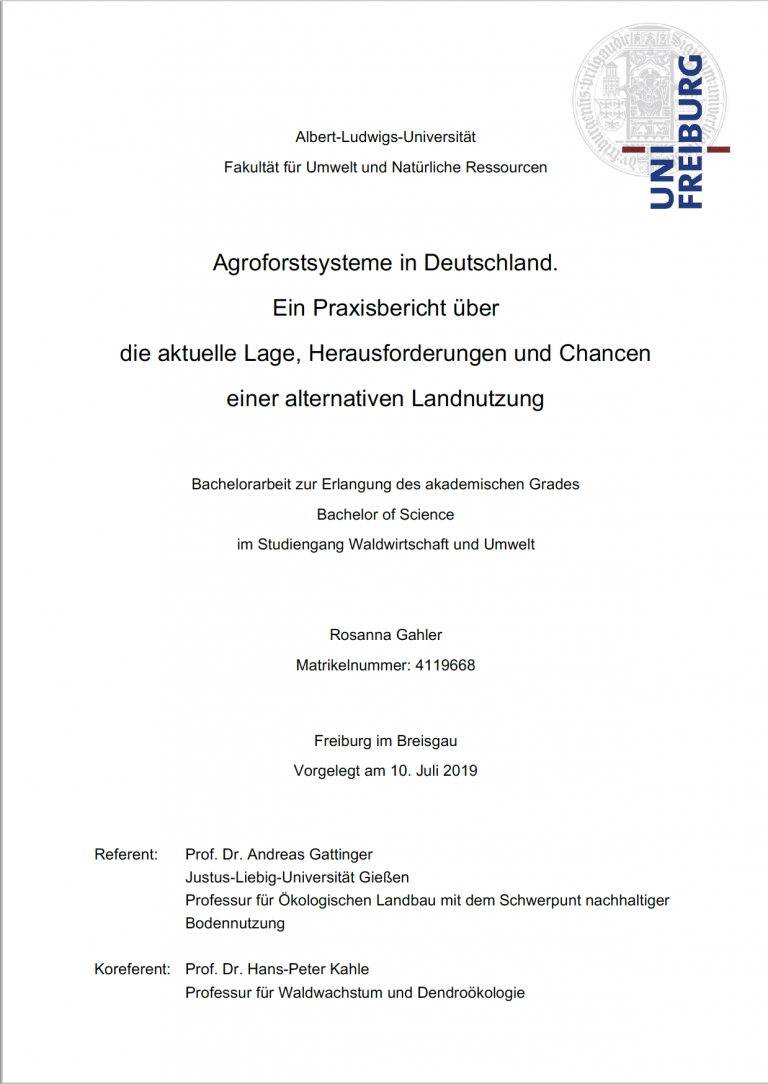
A field report on the current situation, challenges and opportunities of an alternative land use.
B. Sc. Rosanna Gahler, Albert-Ludwigs-University Freiburg, Juli 2019
Guiding principles and social contract of the Finck Foundation
As an independent research institute, we, the Finck Foundation, are aware of our responsibility that comes with the constitutionally granted freedom of research. Based on the Guidelines for Safeguarding Good Scientific Practice of the German Research Foundation (Deutsche Forschungsgemeinschaft e.V.), we have formulated our binding research ethics, which can be viewed here.
In its role as a multiplier, the Finck Foundation would like to draw attention to the latest findings in the field of research and share them with as many interested parties as possible.
A selection of recent articles and papers can be found here.
Agroforestry in general
“Multifunctionality of temperate alley-cropping agroforestry outperforms open cropland and grassland” – A very large study by JKI on the increased multifunctionality of cropland and grassland agroforestry versus pure crops with a large field-based data synthesis, a real milestone in agroforestry research. Published in: Communications Earth & Environment Volume 4, Article number: 20, January 2023.
“Reducing Wind Erosion through Agroforestry: A Case Study Using Large Eddy Simulations” – A case study with modeling from the University of Göttingen. Published in Sustainability, Special Issue Agroforestry for Sustainable Soil Management, October 2022.
“Modification of the microclimate and water balance through the integration of trees into temperate cropping systems” – Review article from University of Giessen. Published in Agricultural and Forest Meteorology, Volume 323, August 2022.
Carbon Storage
“Soil organic carbon sequestration in temperate agroforestry systems – A metaanalysis” – TU Munich metaanalysis. Published in Agriculture, Ecosystems & Environment Volume 323, January 2022.
Insects
“Distribution of overwintering invertebrates in temperate agroforestry systems: implications for biodiversity conservation and biological control of crop pests” – Field-based paper from the University of Montpellier. Published in Agriculture, Ecosystems & Environment Volume 285, December 2019.
Pasture Management
Drought-Adapted Grazing – A Practical Guide to Mob Grazing
Authors: Nils Holger Zahn, Sassa Franke, Josefin Röwekamp, Antonia Beck, Ruven Hener, Inga Schleip, Published by: Klimapraxis gUG, September 2024
Mob Grazing – an alternative grazing strategy?
Basics and overview of the benefits of holistic grazing management, Author: Anne Verhoeven, LWK Nordrhein-Westfalen, VBZL Haus Riswick, Kleve.
Further links on mob grazing and sustainable pasture management
Publications, initiatives, videos and more, compiled by the Mob Grazing network to promote mob grazing as a sustainable grazing practice including practice-based accompanying research.
Plant health
“Crop Diseases and Mycotoxin Accumulation in Temperate Agroforestry Systems” – Field-based measurements by JKI, the only study on this worldwide. Published in Sustainability, 11, May 2019.
Regenerative Agriculture
“The Case for Regenerative Agriculture in Germany – and Beyond” – Boston Consulting Group study, authors: Torsten Kurth, Benjamin Subei, Paul Plötner, and Simon Krämer. January 2023.
Soil Emissions
“Impacts of monoculture cropland to alley cropping agroforestry conversion on soil N2O emissions” – Field-based measurements of N2O by the University of Göttingen. Published in GCB Bioenergy, Volume 15, Issue 1, January 2023.
“Reduced Soil Gross N2O Emission Driven by Substrates Rather Than Denitrification Gene Abundance in Cropland Agroforestry and Monoculture” – Research article on field-based measurements of nitrogen (N2O) by JKI. Published in Journal of Geophysical Research (JGR) Biogeosciences, February 2022.
Soil Microorganisms
“Tree-distance and tree-species effects on soil biota in a temperate agroforestry system” – JKI field-based measurements at Forst an der Lausitz on earthworm abundance and potential plant disease suppression. Published in Plant and Soil, February 2023.
“Abundance, Diversity, and Function of Soil Microorganisms in Temperate Alley-Cropping Agroforestry Systems: A Review” – JKI review article. Published in Microorganisms, March 2022.
“Tree rows in temperate agroforestry croplands alter the composition of soil bacterial communities” – Field-based measurements by JKI. Published in PLoS ONE 16(2), February 2021.
Weeds